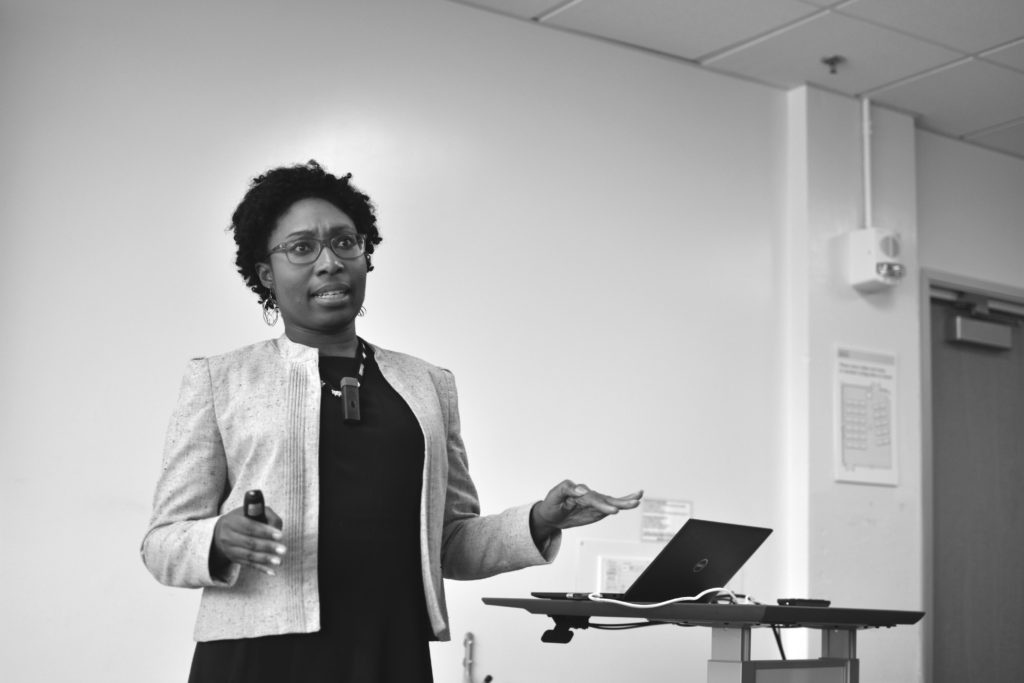Kadian McIntosh presents the process and results of the campus climate research survey on Tuesday, April 23, 2019 in the library events room. (LOLA CHASE/Golden Gate Xpress)
A series of community meetings last week about the implications of the first ever University-wide climate survey left the campus community a 400-page report synthesizing the findings to comb through until additional data is released.
The meetings were intended to help students, staff, and faculty interpret the survey data, which was made public in an April 24 report, according to assistant professor of management Veronica Rabelo.
The report is based on data collected in fall 2018 and it contains both hard numbers and anecdotes from those working and studying at the University. Topics ranged from comfort in the classroom, to experiences of sexual assault and perceptions of support in the workplace by administration.
“I don’t think the data necessarily speak for themselves,” Rabelo said. “They document maybe certain relationships between variables or experiences, but it’s up to us to explain [the significance of the data] based on what we know about campus and how we experience campus.”
According to the report’s executive summary, the Campus Climate Assessment Project aimed to identify challenges and successes within the SF State community. Survey results will be used to develop an action plan for “lasting positive change.”
The report notes in its “opportunities for improvement” section that 25 percent of survey respondents said they experienced hostility, exclusion, intimidation and other offensive conduct on campus largely based on gender identity, staff or student position and ethnicity.
“Our marginalized students especially, Black, low-income and international students are facing unique forms of harm and stress that we can’t ignore,” Rabelo said. “One benefit of this survey is that it provides broader evidence for concerns students have already been bringing up for quite a while. Hopefully it will be harder to ignore.”
She said the report indicates such stress stems from the unique problems members of the community face, like longer commute times and expensive housing costs.
The report also found that of the respondents, 63 percent of faculty and 60 percent of staff contemplated leaving SF State in the past year, citing low pay, bureaucracy and limited opportunities for advancement as key reasons.
“These [factors] fundamentally affect how you experience everyday life on campus, what kind of classes you take, what kind of jobs you do or do not take [and] how engaged or present you are able to be on campus,” Rabelo said.
But Rabelo cautioned against drawing too many conclusions from the data gleaned from the survey because only 7 percent of the population of students, staff and faculty responded.
“We should not generalize the results [of the survey] if we don’t achieve a 30 percent response rate,” Rabelo said. “What that means is we can’t necessarily generalize that the experiences reported in the survey are widely shared by the rest of the campus community.”
Rabelo said, for example, the number of people who were sexually assaulted on campus may be greater or lesser than what the report indicates due to the limited amount of responses.
Greg Dubrow, the University’s director of institutional research said low response rates can stem from survey fatigue, because the University community is often bombarded with questionnaires from data gatherers, but Rabelo said poor communication might also account for the low numbers.
When compared with the overall demographics of the University, the report found members of the Latinx, Asian and Black communities were underrepresented in the survey, as were men.
“You don’t want to overstate or under- state anything [in the findings] if the survey population doesn’t reflect the campus population,” Dubrow said.
Six months from now, according to Dubrow, data from the survey will be released, and interested parties can file requests to obtain any or all data of interest.
“What you always hope for in projects like this is that they don’t just become nice reports that sit on the shelf or sit on a data server,” Dubrow said. “But that people use whatever is actionable from it to make some positive change.”
Assistant professor of mathematics Luella Fu, who read parts of the report, said the data in the report isn’t always clear and could be somewhat difficult to comprehend for students who may just read the summary. “It’s just a preliminary analysis so I feel like you would need more data after this,” Fu said. “It would be good to start investigating those points that seem more significant.”
According to Dubrow, the full scope of the data is being held on secure servers until further notice.
“Something important to remember is that people experience climate differently, in part because climate is affected by things like our race, our gender our income [and] where we live,” Rabelo said. “Essentially the full story is going to be more complicated and nuanced than any kind of qualitative data can narrate, which is exactly why we want to have these conversations.”
Instead she’s put a priority on enhancing class offerings with the 2018-19 funds in an effort to increase graduation rates.
“We got the money in the middle of this year, so what we’re doing in the meantime is directing it towards more classes this year during the summer than we’ve done before, and we’re also directing it to high-demand classes in the next academic calendar,” Summit said. “That’s while we’re in the process of hiring our new tenure-track faculty.”
Neith hire more tenure-track faculty with the money they got—except for San Francisco State.”
Correction: In the Tuesday, May 7, 2019 (Vol. 109, Issue 14) print issue and in a previous online version, the name Rabelo was misspelled in a quote. Xpress regrets this error. (Tuesday, May 7, 2019/12:47 p.m.)







